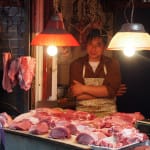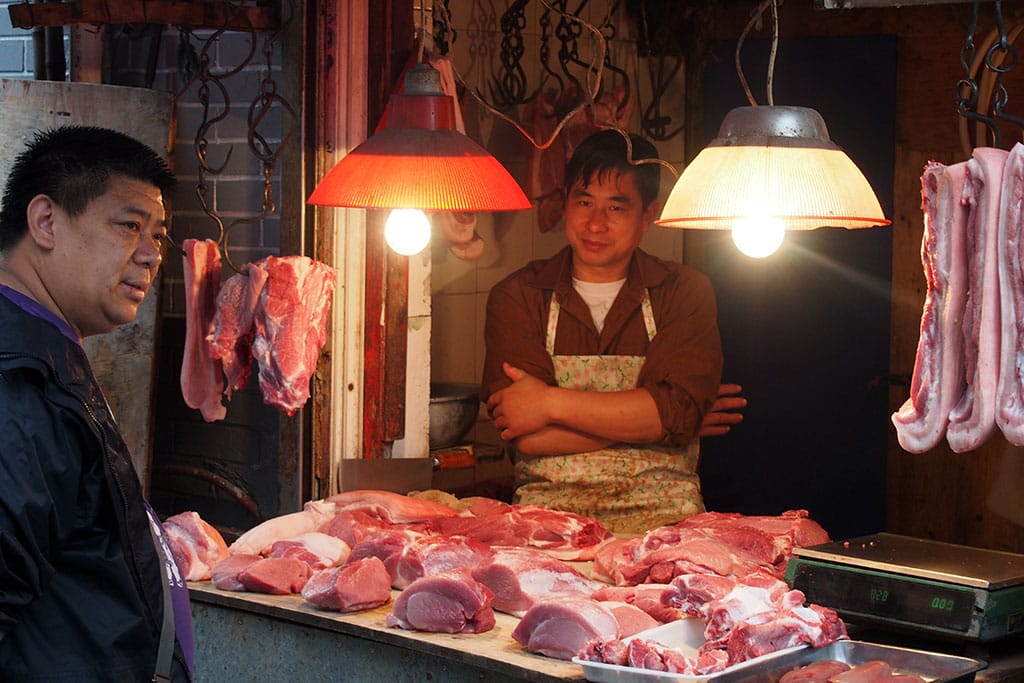In typical Shanghai fashion, good things come to those willing to stand in the longest lines, or to pre-book the farthest in advance. We’ve seen the queue for braised duck at Guang Ming Cun swell to several hours long during the Chinese New Year, and A Da’s scallion pancakes require a minimum hourlong wait on most days, yet we had never expected the same for the humble zòngzi (粽子).
Recently, as we approached one of Shanghai’s most highly rated zongzi vendors, the absence of a line, and the presence of a small “sorry” sign, signaled to us that something was amiss. Turns out if you want to get their hot commodities during the Dragon Boat Festival season when they are traditionally eaten, you’ll need to reserve three months in advance. No amount of cajoling the salesgirl will do. Luckily for the curious (and impatient) eater, there are plenty of other good places to try zongzi throughout the city. These dumplings may not look like much, but hidden inside the pyramid-shaped wrapping of bamboo leaves lies steamed glutinous rice mixed with a variety of sweet or savory fillings. Not all zongzi are created equally, and while Northern China tends to prefer red bean paste and jujube-rice mixtures, Shanghai generally opts for a pork and egg yolk stuffing.
Although zongzi can also be found at other times of the year, many specialty sellers only pop up around the time of China’s famous Dragon Boat Festival, or Duānwǔ Jié (端午节), celebrated on the fifth day of the fifth month of the lunar calendar – which falls on June 20 this year. Because the fifth lunar month is traditionally considered inauspicious, the holiday is filled with customs to ward off evil spirits and disease for the year ahead. Children wear colorful, perfumed pouches for protection, while others participate in dragon boat races in large teams with a drum-wielding coxswain.
As with other Chinese holidays, the culinary traditions associated with Dragon Boat Festival are carried out with rigor, and the morbid legends surrounding the festival’s origins are up for vigorous debate and speculation. According to mainstream festival lore, the zongzi are eaten to commemorate a patriotic poet named Qu Yuan (340-278 B.C.), who was an important advisor to the emperor. When his warnings about an invading army weren’t heeded, Qu Yuan is said to have committed suicide in the Milou River. Others say he killed himself in an act of protest against imperial corruption. Either way, the local villagers did not want the fish to feed on such a respected person’s body, so they tossed delicious zongzi in the river for them to eat instead.
the local villagers did not want the fish to feed on such a respected person’s body, so they tossed delicious zongzi in the river for them to eat instead.
An alternative legend claims that the villagers were actually trying to feed the deceased poet’s spirit, but every time they threw in rice, the fish gobbled it up. They solved the problem by wrapping the rice in bamboo leaves and tying the bundles up, so that only someone with opposable thumbs could unwrap and eat the treats. Meanwhile, some modern scholars believe Qu Yuan committed suicide when the local king, Huai of Chu, did not reciprocate his professed love. This has led to a number of Chinese gays and lesbians reappropriating the holiday as a “gay Valentine’s Day.” Finally, yet another theory says that the Dragon Boat Festival may have actually been superimposed on a pre-existing culinary tradition.
While the reasons for celebrating the holiday may have evolved over the years, little has changed when it comes to the main food item. Vendors still dole out the neatly wrapped nuggets by the hundreds each day in the month preceding the holiday, as they have for centuries. Here are our top places for zongzi:
Fuxing Lu Wet Market
Though you can head to just about any neighborhood “wet market” and find the zongzi booth, the market on Fuxing Lu – our choice for Shanghai’s best wet market for snacking – is home to a standout zongzi vendor, Mr. Yao, who sells the delicacy nine months of the year (he returns to his provincial home in Anhui province from July to September, after the festival rush). He has a variety on offer, from red date (密枣, mìzǎo) to red bean paste (豆少粽, dòushǎo zòng), as well as the standard Shanghainese pork and egg yolk (蛋黄鲜肉粽, dànhuáng xiān ròu zòng) kind.
Guangyuan Lu Wet Market
Tucked into a quiet residential street near the bustling Xujiahui shopping district, the Guangyuan Lu wet market is another good choice. Indeed, it’s one of the cleanest and most orderly markets we’ve come across in Shanghai. Look for the zongzi near the central entrance of the market on the north side.
 Mrs. Wang
Mrs. Wang
At her stand tucked into an alley off Xinle Lu, Mrs. Wang only makes zongzi during the month leading up to the festival. With her XL-sized zongzi that have a delicious hunk of pork belly and a duck egg yolk tucked inside, she knocks the competition out with one bite. Her secret? A dash of MSG with the glutinous rice-soy sauce mixture. These zongzi cost 11 RMB ($1.75) – about three times the price of their smaller, blander competitors – but there’s no question they’re worth it.
This feature was originally published on June 7, 2013.
Published on June 19, 2015
Related stories
February 8, 2013
ShanghaiAs the moon starts to wane each January, people throughout China frantically snatch up train and bus tickets, eager to start the return journey to their hometown to celebrate the Lunar New Year (春节, chūnjié) with their family. One of the major draws for migrant workers heading home is the chance to eat traditional, home-cooked…
October 20, 2015
ShanghaiDear Culinary Backstreets, I’ve heard about “wet markets,” but what are they exactly? And where can I find the best wet markets in Shanghai? Stocked with all the fresh produce and live seafood that hungry Shanghai residents could ever cook up, wet markets are an essential alternative to the brand-name supermarkets vying for their slice…
July 18, 2014
ShanghaiEditor's note: We're sorry to report that the vendors and restaurants at Sipalou Lu and Fangbang Lu have suffered the same fate as those on Wujiang Lu and have been shut down. For street food, head to the area around Er Guang. In the lead-up to the 2010 World Expo, the government tore down one of…


















































































